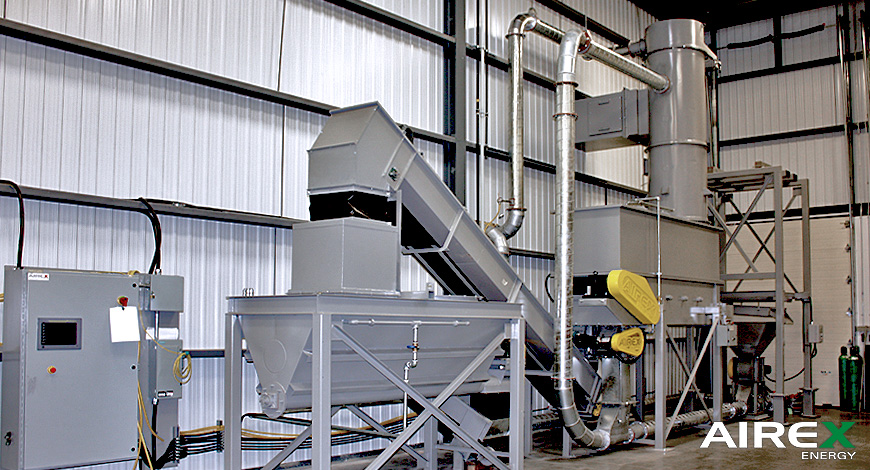“Biomass torrefaction is an innovative solution for companies that want to reduce greenhouse gas emissions and lower operating costs,” says Sylvain Bertrand of Airex Énergie, which recently received $2.7 million in funding for a biomass torrefaction pilot plant in Laval, Quebec. The carbon-neutral material has the potential to replace bituminous coal and fuel oil in combustion, filtration and metallurgical applications.
Torrefaction is a controlled carbonization process during which biomass is heated to high temperatures with little or no oxygen. The resulting product is a coal-like substance, known as bio-coal or bio-char, which can be pelletized and burned for energy.
Studies suggest that compared to conventional biomass, bio-coal contains up to 40 percent more energy per unit mass. The material can also resist rot due to its hydrophobic nature and can be torrefied from a variety of feedstock including bark, recycled wood and agricultural waste. Moreover, since it behaves like coal, bio-coal can be fired within the same infrastructure.
Bertrand explains that Airex Énergie, a division of Airex Industries Inc., a manufacturer of industrial dust collection systems and CIPEC Leader in the
General Manufacturing sector, has already developed a pilot-scale torrefaction unit, the company’s patented CarbonFX technology, which produces 250 kilograms (kg) of bio-coal per hour. For example, Colacem Canada Inc.’s cement plant in Grenville-sur-la-Rouge, Quebec, fired a mixture of the bio-coal and coal in January 2012.
Construction of the 930-square metre demonstration plant is expected to commence in summer of 2013. The plant will be fully operational by the end of the year. The demonstration plant will allow for the production of a larger quantity of biocoal for other tests at industrial sites.
Initially, Bertrand sees one very important application for the bio-coal in asphalt plants, where drum burners already exist that could readily accommodate the biomass. For this industry, Bertrand estimates the cost to be $10 per gigajoule (GJ), which is competitive with respect to the heavy and light fuel oils that are commonly used in Quebec. Bertrand also notes that as the amount of carbon is increased to around 80 percent, the torrefied material could replace metallurgic coke. “The use of bio-char carbon in the metallurgical industry could be competitive in Quebec.”
Funding for the demonstration plant is being provided by
Sustainable Development Technology Canada (SDTC) while the pilot plant was funded by
Canadian Forest Services’ Transformation Technologies Program, Natural Resources Canada and project partners including Comact Equipment Inc.
Source : Natural Ressources Canada. «Airex Énergie to build biomass torrefaction pilot plant in Laval, Quebec»,
Heads Up CIPEC Newsletter - May 2013 Vol. XVII, No. 7

